 Petzlover
Petzlover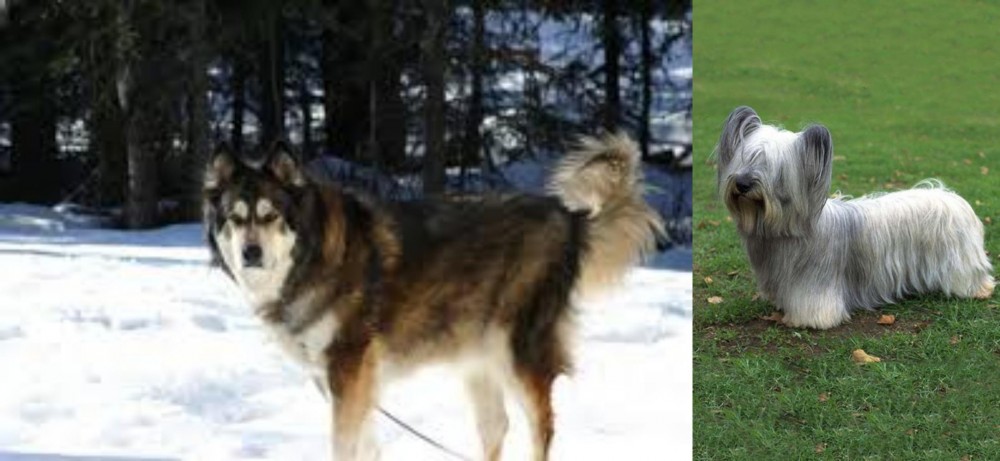 Mackenzie River Husky is originated from United States but Skye Terrier is originated from United Kingdom. Mackenzie River Husky may grow 48 cm / 19 inches higher than Skye Terrier. Mackenzie River Husky may weigh 29 kg / 64 pounds more than Skye Terrier. Both Mackenzie River Husky and Skye Terrier has almost same life span. Mackenzie River Husky may have more litter size than Skye Terrier. Both Mackenzie River Husky and Skye Terrier requires Moderate Maintenance.
Mackenzie River Husky is originated from United States but Skye Terrier is originated from United Kingdom. Mackenzie River Husky may grow 48 cm / 19 inches higher than Skye Terrier. Mackenzie River Husky may weigh 29 kg / 64 pounds more than Skye Terrier. Both Mackenzie River Husky and Skye Terrier has almost same life span. Mackenzie River Husky may have more litter size than Skye Terrier. Both Mackenzie River Husky and Skye Terrier requires Moderate Maintenance.
 The name Mackenzie River Husky was given to these huskies by those wanting to name the freight huskies of a certain area. The name took hold in the 1960’s, but the dog began to disappear with the introduction of snow machines.
The name Mackenzie River Husky was given to these huskies by those wanting to name the freight huskies of a certain area. The name took hold in the 1960’s, but the dog began to disappear with the introduction of snow machines.
They’re a mixture of native sled dogs - Newfoundlands, St. Bernards, Staghounds and Wolf. As a mixed breed, they have always been regarded as classic sled dogs.
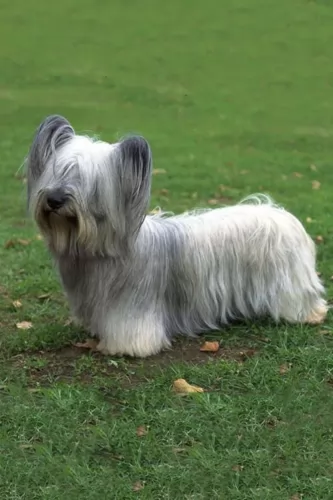 The Skye Terrier is a hardy dog breed and is actually considered to be an endangered native dog breed in the United Kingdom.
The Skye Terrier is a hardy dog breed and is actually considered to be an endangered native dog breed in the United Kingdom.
They were found on the Isle of Skye, although there is some confusion about its history. They were used long ago to hunt but these days they are essentially companion dogs.
They found their way to America and the Skye Terrier Club of America was founded in 1938. The American Kennel Club recognized the breed in 1887.
 The beautiful Mackenzie River Husky stands at 66 to 74cm in height and weighs between 29 and 47kg.
The beautiful Mackenzie River Husky stands at 66 to 74cm in height and weighs between 29 and 47kg.
This deep chested dog has a long, straight coat with the colors being typically wolf-like – white, cream, black, tan, blonde and red. He has erect ears, long legs and a long, bushy tail.
This wolf-type dog is strong willed and independent and was always a pack dog. They wouldn’t be described as a good choice for the first time dog owner as they do seem to have some wolf traits and will require a strong, firm, level headed owner.
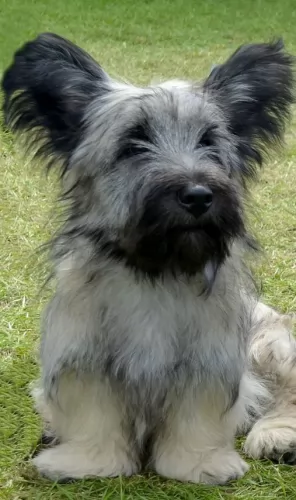 The Skye Terrier is a medium-sized dog standing at between 23 and 26cm in height and weighing between 12 and 18kg. The legs are short and sturdy. He is double coated with the top coat being straight and hard and forming a beard around the face area. The coat can be fawn, and in various shades of grey which are sometimes even black. The ears of the dog are medium sized and erect.
The Skye Terrier is a medium-sized dog standing at between 23 and 26cm in height and weighing between 12 and 18kg. The legs are short and sturdy. He is double coated with the top coat being straight and hard and forming a beard around the face area. The coat can be fawn, and in various shades of grey which are sometimes even black. The ears of the dog are medium sized and erect.
The Skye Terrier has always been a hunting dog and he enjoys quite a bit of exercise – walks, ball games as well as indoor games. Small though he may be, he is strong willed with a mind of his own and will benefit from being trained and socialized.
This is also necessary as he has a fairly reserved nature. He gets on well with children and makes an excellent family pet but he is ready to take on smaller pets in the home. He will bark when confronting strangers and makes an excellent watchdog too.
He is able to adapt well into life in the city or the countryside. He isn’t a dog to be left outside day after day and will just die of boredom, frustration and loneliness.
 Your MacKenzie River Husky is such a likeable pet to have. True, he does tend to be a bit stubborn and independent but there is nothing that training and socialization won’t do for him. You’ll find him much more obedient and amicable, and he gets on well with children and pets in the home.
Your MacKenzie River Husky is such a likeable pet to have. True, he does tend to be a bit stubborn and independent but there is nothing that training and socialization won’t do for him. You’ll find him much more obedient and amicable, and he gets on well with children and pets in the home.
He is an intelligent dog too and very energetic so will require an owner who is active, firm and consistent. He thrives on human company and just wants to be around his owner all the time, ready to join in with any activity happening in his life.
He is therefore far more suited to life in the countryside than to the city. Loyal, devoted and loving, a MacKenzie River Husky isn’t only a beautiful dog to own, he promises to offer everything you want in a 4-legged friend.
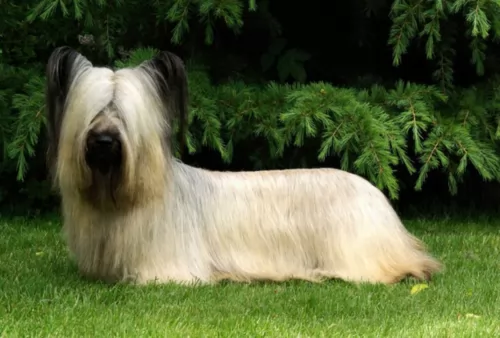 Give the Skye Terrier the attention he wants and he will reward you with his loving companionship.
Give the Skye Terrier the attention he wants and he will reward you with his loving companionship.
He loves the entire family but is best suited to homes where children have been taught to be kind to animals and to treat them with respect.
He has moderate energy levels and will expect you to give him a fair amount of exercise. The Skye Terrier can make an excellent companion for you and your family.
 Your MacKenzie River Husky, regardless of how healthy he is, can suffer with some common health problems that all dogs are prone to.
Your MacKenzie River Husky, regardless of how healthy he is, can suffer with some common health problems that all dogs are prone to.
Perhaps one of the more common health problems that this particular dog breed has to contend with is cataracts, hip dyslasia and hypothyroidism.
Many people associate cataracts in dogs with age, little realizing that there are many medical reasons as to why our pets develop cataracts. Cataracts can start as early as 6 months of age, although this is unlikely. They come about because of a disease which affects the lens of the eye, causing the lens to lose its transparency.
You’ll notice a whitish/grey shade in your dog’s eye and this can actually impair vision. Cataracts are particularly the lot of diabetic dogs. It can certainly help to have your dog’s eyes checked by a vet regularly.
This is another fairly common problem with Huskies. It’s almost like a death sentence if your MacKenzie is a working dog because it can lead to lameness. The disease can lead to problems in the hip joint which cab be debilitating ad give your dog a lot of pain.
It doesn’t strike old dogs only, but can be the lot of young dogs too. Sometimes treatment will require surgery but there are non-invasive options too. You want to make sure that you don’t allow your pet to become overweight as this can contribute to developing hip dysplasia.
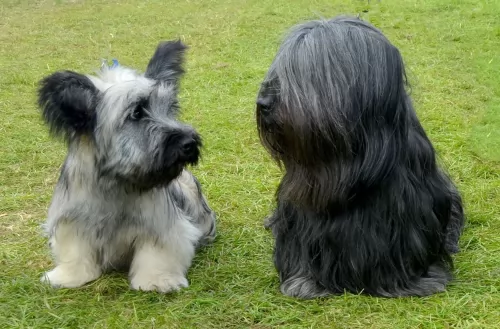 The Skye Terrier is a healthy dog breed. Perhaps the only issue that could be a problem with him is orthopedic problems. He is an achondroplastic dog, meaning a large body on small legs.
The Skye Terrier is a healthy dog breed. Perhaps the only issue that could be a problem with him is orthopedic problems. He is an achondroplastic dog, meaning a large body on small legs.
He could develop spinal problems if he were allowed to constantly be jumping off beds and high chairs.
Orthopedic problems affect the bones, muscles and joints and can actually be debilitating. Orthopedic conditions can be ligament tears or hip dysplasia for instance, accompanied by arthritis.
You’ll notice your dog has an abnormal way of walking or running, inability to get up once lying down and he may have arthritis and pain.Be careful because obesity can trigger problems with the joints and bones.
 Huskies like this one will require a good deal of exercise every single day. These are working dogs who have always had a job to do and you can certainly count him in when you do your hiking walks, swimming – you name it. The only thing he will object to is that he doesn’t do well in hot weather. Strong-willed, you’ll want your MacKenzie River Husky trained and socialized if you want him to be a companionable dog.
Huskies like this one will require a good deal of exercise every single day. These are working dogs who have always had a job to do and you can certainly count him in when you do your hiking walks, swimming – you name it. The only thing he will object to is that he doesn’t do well in hot weather. Strong-willed, you’ll want your MacKenzie River Husky trained and socialized if you want him to be a companionable dog.
Dogs need to be fed according to the size, their age and their lifestyle. If your MacKenzie River Husky is an active working dog, his food must be the very best and contain enough calories to cover the daily caloric expenses.
Quality and the amount of vitamins and minerals in the food is most important for a dog like this. If you feed him commercially manufactured food, make sure its high quality and not made up of fillers, and other bad stuff. Read the label and understand exactly what’s going into your dog’s stomach.
Simplicity with feeding is best for your pet. Treat him occasionally to cooked chicken, brown rice, pasta and cooked or raw vegetables which can be added into his dry kibble. A dog like this will require some raw meat as well to ensure his coat and eyes are always shiny and bright.
Grooming of the MacKenzie River Husky must be done at least twice a week to get rid of loose hairs.
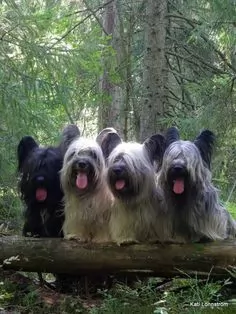 ● The coat of the Skye Terrier is long and silky and will most certainly require brushing every day if you keep the hair long. Such silky hair can easily become matted.
● The coat of the Skye Terrier is long and silky and will most certainly require brushing every day if you keep the hair long. Such silky hair can easily become matted.
● Little dogs like this will need their teeth being checked regularly. You can even try to buy special pet toothpaste and toothbrush and brush his teeth yourself. If you prefer, a professional dog groomer can do this for you and at the same time trim his nails and check his ears and clean the insides of the ears too to avoid infection.
● Provide him with top quality food as the quality of the dog food you buy makes a huge difference to his health and longevity. He is a small dog and there are some excellent commercially manufactured dog foods specially made for small, energetic dogs.
Try to include some home-made food for him which can be simply mixed into the dry kibble twice a week. Boiled chicken, brown rice or pasta and spinach, sweet potatoes and carrots is super tasty and nutritious. Ensure there is always a bowl of fresh, cool water within his reach.
● Keep his vaccines up to date against some deadly canine diseases, and get him to the vet when he shows signs of illness.